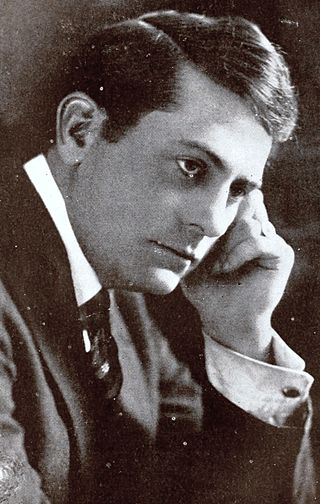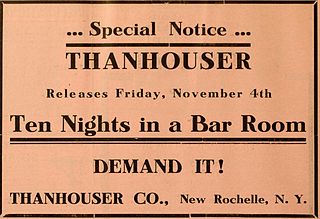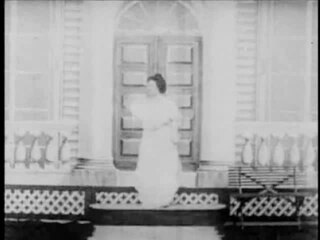
Caroline Amelia Nation, often referred to by Carrie, Carry Nation, Carrie A. Nation, or Hatchet Granny, was an American who was a radical member of the temperance movement, which opposed alcohol before the advent of Prohibition. Nation is noted for attacking alcohol-serving establishments with a hatchet. She married David Nation in 1874. She was previously known by either her birth name, Carrie Moore and, after her first marriage in 1867, as Carrie Gloyd.

The Hallelujah Trail is a 1965 American Western epic mockumentary spoof directed by John Sturges, with top-billed stars Burt Lancaster, Lee Remick, Jim Hutton and Pamela Tiffin. It was based on the book of the same title by Bill Gulick in 1963.

Life of an American Fireman is a short, silent film Edwin S. Porter made for the Edison Manufacturing Company. It was shot late in 1902 and distributed early in 1903. One of the earliest American narrative films, it depicts the rescue of a woman and child from a burning building. It bears notable similarities to the 1901 British short film Fire!, directed by James Williamson.

Edwin August Phillip von der Butz was an American actor, director, and screenwriter of the silent era.

Don't Change Your Husband is a 1919 American silent comedy film directed by Cecil B. DeMille and starring Gloria Swanson. The film was the third of six "marriage films" directed by DeMille and the first DeMille film starring Gloria Swanson. A Chinese silent film, Don't Change Your Husband (1929), used the same English title, and a similar plot arc.
The Treasures from American Film Archives series of DVDs is produced by the National Film Preservation Foundation (NFPF), a nonprofit organization created by the U.S. Congress in 1997. The NFPF publishes these DVD sets, with accompanying booklets and extensive commentary, to promote public access to the films preserved by the American archival community.
George S. Fleming was an American actor, director, and scenic designer whose short films were influential early projects in the medium.

Execution of Czolgosz with Panorama of Auburn Prison is a 1901 silent film produced by the Edison Studios arms of Edison Manufacturing Company. The film is a dramatic reenactment of the execution of Leon Czolgosz by electric chair at Auburn Correctional Facility following his 1901 conviction for the assassination of William McKinley. It is considered an important film in the history of cinema.

In the United States, the temperance movement, which sought to curb the consumption of alcohol, had a large influence on American politics and American society in the nineteenth and twentieth centuries, culminating in the prohibition of alcohol, through the Eighteenth Amendment to the United States Constitution, from 1920 to 1933. Today, there are organizations that continue to promote the cause of temperance.

Kansas Saloon Smashers is a 1901 comedy short film produced and distributed by Edison Studios. Directed by Edwin S. Porter, it is a satire of American activist Carrie Nation. The film portrays Nation and her followers entering and destroying a saloon. After the bartender retaliates by spraying Nation with water, policemen order them out; the identities of the actors are not known. Inspiration for the film was provided by an editorial cartoon which appeared in the New York Evening Journal.

Ten Nights in a Bar Room is a 1910 American silent short drama produced by the Thanhouser Company. Adapted from the novel Ten Nights in a Bar-Room and What I Saw There by Timothy Shay Arthur, the production focuses on Joe Morgan after he has become a hopeless drunkard. Often Morgan's young daughter, Mary, comes to beg her father to return home. One day, she appears during a fight between the two men and is fatally struck by a bottle thrown by the saloon-keeper. Before Mary dies she asks her father to promise to swear off alcohol and he accepts. He is reformed and becomes successful, while the saloon-keeper is killed in a fight in an irony of fate. The film was released on November 4, 1910 and met with mixed reviews. The film is presumed lost.

"Weary Willie" Kisses the Bride is a surviving 1904 silent comedy short film produced by Thomas Edison and directed by Edwin S. Porter and preserved from a paper print in the Library of Congress. The film was copyrighted as Nervy Nat Kisses the Bride, but sold as "Weary Willie". Another 1904 Porter short was released called "Weary Willie" Kidnaps a Child.

Women's suffrage, the legal right of women to vote, has been depicted in film in a variety of ways since the invention of narrative film in the late nineteenth century. Some early films satirized and mocked suffragists and Suffragettes as "unwomanly" "man-haters," or sensationalized documentary footage. Suffragists countered these depictions by releasing narrative films and newsreels that argued for their cause. After women won the vote in countries with a national cinema, women's suffrage became a historical event depicted in both fiction and nonfiction films.

The Kleptomaniac, is a 1905 American silent drama film, directed by Edwin S. Porter partly filmed on location in New-York denouncing the discriminatory treatment of the poor by the justice system. It is one of the first American social drama and Courtroom drama.

The Seven Ages is a 1905 American silent comedy film, directed by Edwin S. Porter inspired by the monologue All the World's a Stage in William Shakespeare's comedy As You Like It.

The 'Teddy' Bears is an American silent film directed by Edwin S. Porter and Wallace McCutcheon, and produced by the Edison Manufacturing Company starting as the fairy tale Goldilocks and ending as a political satire of United States President Theodore Roosevelt.

Cold Water Army was an American temperance organization for children. It was established in 1839 by Rev. T. P. Hunt, who was affiliated with the American Temperance Society (ATS). In its day, hundreds of thousands of children belonged to the society. The movement attained its height in 1843, but interest was diminished by the Washingtonian movement, whose members absorbed almost the whole attention of the temperance movement community. Yet for several years, these youthful organizations continued to exist in various locations. Even as late as 1862, some of these societies were known to be active.

The Whole Dam Family and the Dam Dog is a 1905 silent short comedy film directed by Edwin S. Porter for the Edison Manufacturing Company. The five-and-a-half minute film was an adaptation of a popular picture postcard featuring a humorously named family. The film introduces each member of the Dam family, and then shows a raucous dinner scene that ends with the Dam dog pulling the tablecloth off the table, and ruining the Dam meal.

Laura Comstock's Bag-Punching Dog is a 1901 silent short film directed by Edwin S. Porter. The film depicts a vaudeville act featuring Laura Comstock and her trained dog, a pit bull named Mannie. Comstock's act was currently appearing at Keith's Union Square Theatre.

The Old Maid Having Her Picture Taken is a 1901 silent short film directed by Edwin S. Porter in collaboration with George S. Fleming. The comic film depicts an unattractive old woman arriving at a photo studio to have her picture taken, and destroying all of the equipment through the power of her ugliness.


















